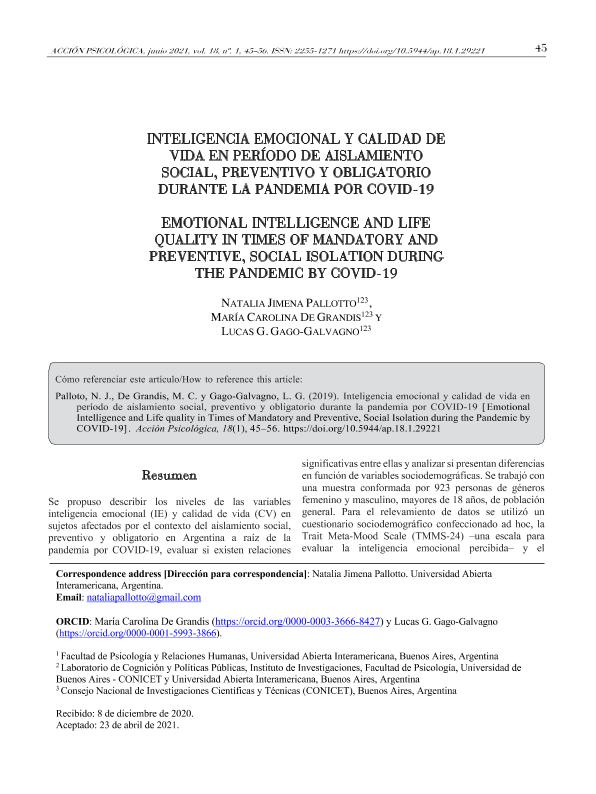Mostrar el registro sencillo del ítem
dc.contributor.author
Pallotto, N. J.
dc.contributor.author
de Grandis, María Carolina

dc.contributor.author
Gago Galvagno, Lucas Gustavo

dc.date.available
2021-11-03T15:46:33Z
dc.date.issued
2021-06
dc.identifier.citation
Pallotto, N. J.; de Grandis, María Carolina; Gago Galvagno, Lucas Gustavo; Inteligencia emocional y calidad de vida en período de aislamiento social, preventivo y obligatorio durante la pandemia por COVID-19; Universidad Nacional de Educación a Distancia. Facultad de Psicología; Acción Psicológica; 18; 1; 6-2021; 45-56
dc.identifier.issn
1578-908X
dc.identifier.uri
http://hdl.handle.net/11336/145830
dc.description.abstract
Se propuso describir los niveles de las variables inteligencia emocional (IE) y calidad de vida (CV) en sujetos afectados por el contexto del aislamiento social, preventivo y obligatorio en Argentina a raíz de la pandemia por COVID-19, evaluar si existen relaciones significativas entre ellas y analizar si presentan diferencias en función de variables sociodemográficas. Se trabajó con una muestra conformada por 923 personas de géneros femenino y masculino, mayores de 18 años, de población general. Para el relevamiento de datos se utilizó un cuestionario sociodemográfico confeccionado ad hoc, la Trait Meta-Mood Scale (TMMS-24) –una escala para evaluar la inteligencia emocional percibida– y el Multicultural Quality of Life Index (MQLI), o índice multicultural de calidad de vida. La muestra fue contactada virtualmente entre el 29 de marzo y el 6 de julio de 2020. Los resultados arrojaron que la correlación entre las variables IE y CV fue significativa. Las dimensiones de dichas variables presentaron una fuerza de relación débil entre sí, exceptuando atención emocional, que correlacionó con una fuerza de vínculo fuerte con plenitud espiritual y apoyo social-emocional, y moderadamente con funcionamiento interpersonal. Los niveles de la variable CV se describen como buenos para la mayoría de los sujetos de la muestra. Los niveles de IE se describen como adecuados para ambos géneros en casi todas las subescalas exceptuando la dimensión claridad emocional, resultando poca para el masculino y adecuada para el femenino. Respecto al vínculo de IE y CV en función de variables sociodemográficas, se obtuvieron diferencias significativas entre grupos; y el grupo etario 71-80 años, quienes no consumen sustancias psicoactivas suscriptas por un profesional y los que poseen una red de contención recreativa obtuvieron mayores puntuaciones. En conclusión, si bien se encontraron asociaciones, los resultados sugieren la necesidad de estudios longitudinales que contemplen las diferentes fases de la cuarentena.
dc.description.abstract
Our goal is to describe the levels of the variables Emotional Intelligence (EI) and Quality of Life (QoL) in subjects affected by the context of Social, Preventive and Mandatory Isolation decreed on March 20 in Argentina during the COVID-19 pandemic, evaluate if there are significant relationships between them and analyze if they present differences based on sociodemographic variables such as: age and gender. We worked with a sample made up of 923 female and male people over 18 years of age from the general population. An ad-hoc sociodemographic questionnaire, the Trait Meta-Mood Scale (TMMS-24) instrument, and the Multicultural Quality of Life Index (MQLI) were used for data collection. The sample was contacted online from March 29 to July 6, 2020. The results showed that the correlation between the variable IE and CV was significant. The dimensions of these variables presented weak relationship strength with each other except Emotional Attention that only significantly correlated with a strong link strength with the variables Spiritual Fullness and Social Support as well as with Interpersonal Functioning, this time with moderate link strength. The levels of the CV variable are described as good in most of the subjects in the sample. EI levels are described as adequate for both genders in almost all subscales, presenting a difference for the gender in Emotional Clarity, resulting little for the male and adequate for the female, thus corroborating the hypotheses raised. Regarding the link between the EI and QOL variables based on the sociodemographic variables, significant differences were obtained in groups, being those between 71 and 80 years old, who do not consume psychoactive substances underwritten by a professional, and those who have a recreational containment network who obtained higher scores. In conclusion the results suggest that, although associations were found, longitudinal studies are necessary to consider the different phases of quarantine.
dc.format
application/pdf
dc.language.iso
spa
dc.publisher
Universidad Nacional de Educación a Distancia. Facultad de Psicología
dc.rights
info:eu-repo/semantics/openAccess
dc.rights.uri
https://creativecommons.org/licenses/by-nc/2.5/ar/
dc.subject
INTELIGENCIA
dc.subject
EMOCIÓN
dc.subject
CALIDAD
dc.subject
COVID-19
dc.subject.classification
Otras Psicología

dc.subject.classification
Psicología

dc.subject.classification
CIENCIAS SOCIALES

dc.title
Inteligencia emocional y calidad de vida en período de aislamiento social, preventivo y obligatorio durante la pandemia por COVID-19
dc.title
Emotional Intelligence and Life quality in Times of Mandatory and Preventive, Social Isolation during the Pandemic by COVID-19
dc.type
info:eu-repo/semantics/article
dc.type
info:ar-repo/semantics/artículo
dc.type
info:eu-repo/semantics/publishedVersion
dc.date.updated
2021-11-03T14:56:27Z
dc.identifier.eissn
2255-1271
dc.journal.volume
18
dc.journal.number
1
dc.journal.pagination
45-56
dc.journal.pais
España

dc.journal.ciudad
Barcelona
dc.description.fil
Fil: Pallotto, N. J.. Universidad de Buenos Aires. Facultad de Psicología. Instituto de Investigaciones; Argentina. Universidad Abierta Interamericana. Facultad de Psicología; Argentina
dc.description.fil
Fil: de Grandis, María Carolina. Consejo Nacional de Investigaciones Científicas y Técnicas; Argentina. Universidad Abierta Interamericana. Facultad de Psicología; Argentina. Universidad de Buenos Aires. Facultad de Psicología. Instituto de Investigaciones; Argentina
dc.description.fil
Fil: Gago Galvagno, Lucas Gustavo. Consejo Nacional de Investigaciones Científicas y Técnicas; Argentina. Universidad Abierta Interamericana. Facultad de Psicología; Argentina. Universidad de Buenos Aires. Facultad de Psicología. Instituto de Investigaciones; Argentina
dc.journal.title
Acción Psicológica
dc.relation.alternativeid
info:eu-repo/semantics/altIdentifier/url/http://revistas.uned.es/index.php/accionpsicologica/article/view/29221
dc.relation.alternativeid
info:eu-repo/semantics/altIdentifier/doi/http://dx.doi.org/10.5944/ap.18.1.29221
Archivos asociados
